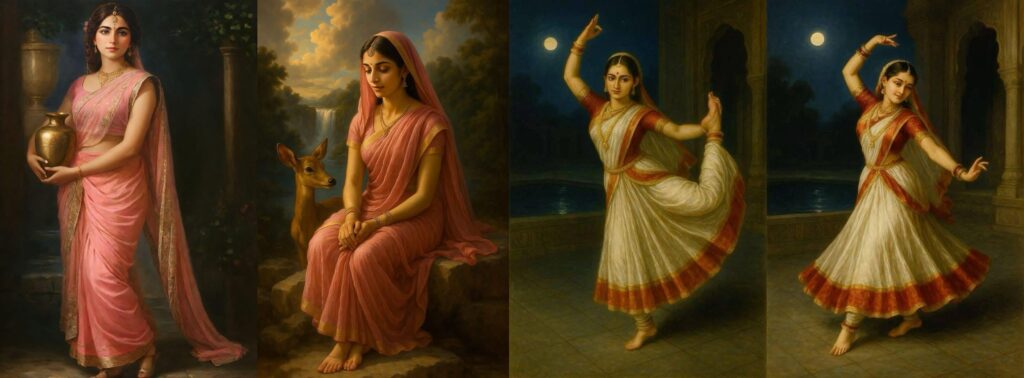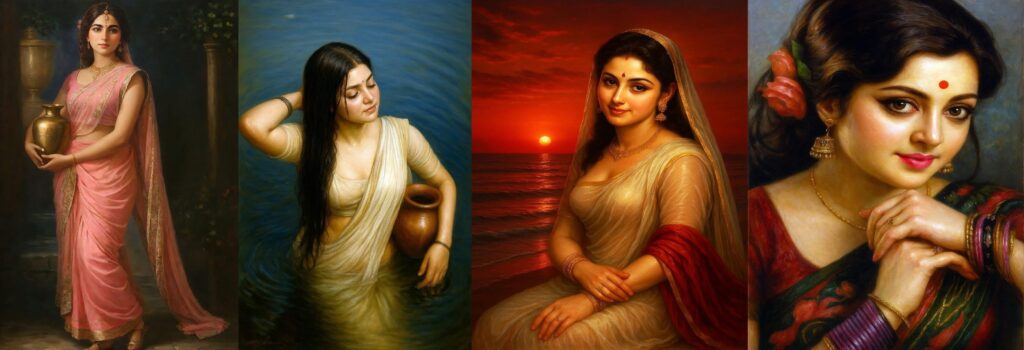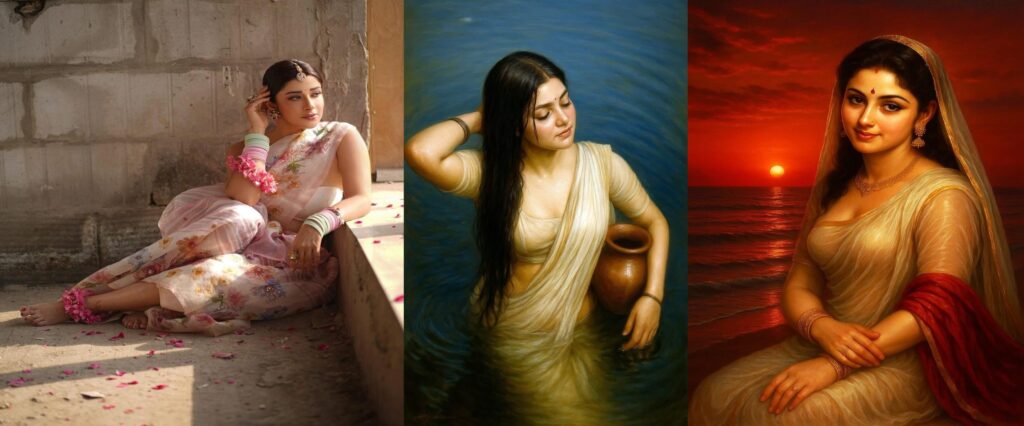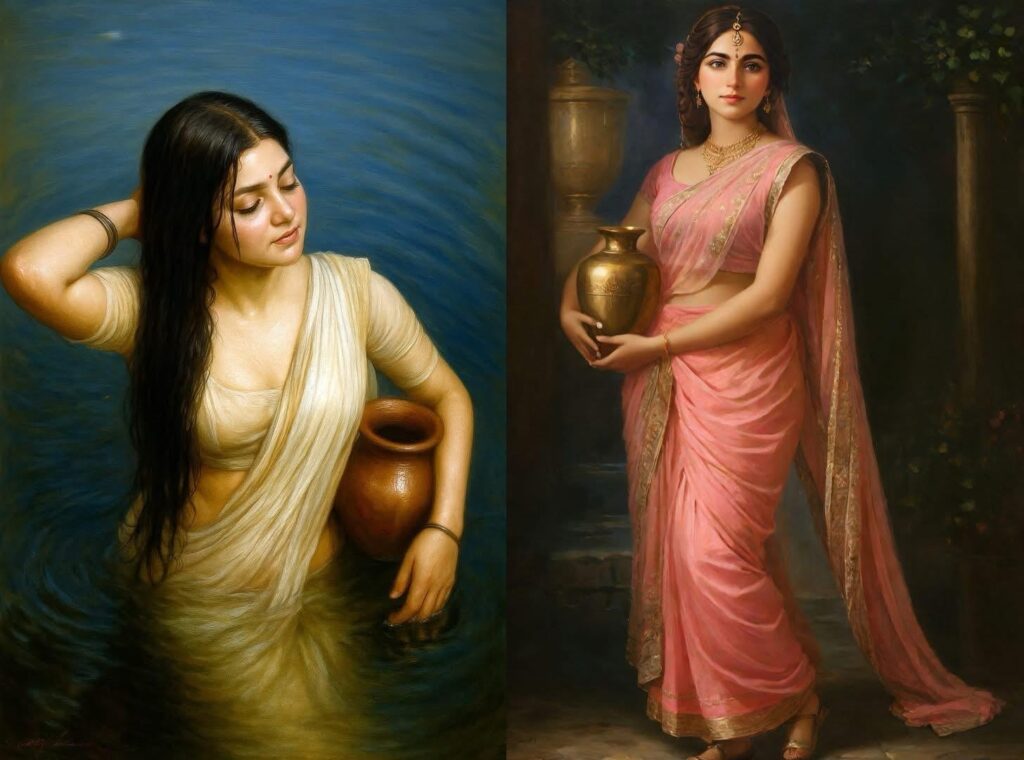Tilottama – The Jewel of Sacrifice
By Lokanath Mishra
Long ago, in an age when the earth trembled under the feet of tyrants, there were born two asura brothers — Sunda and Upasunda. They were bound by a love so fierce that nothing could come between them. Together, they performed terrible austerities and won a boon from Brahma: that none could slay them save each other.
Drunk on power, they crushed gods, men, and yakshas alike, laying waste to forests, rivers, and heavens. The three worlds wailed in fear.
The devas, defeated and humiliated, approached the Creator. “O Pitamaha,” they cried, “your children destroy all creation. None can stand before them. Only you can save us.”
Brahma sat in deep meditation. To break a bond forged in brotherhood, he could not send armies or weapons — he had to send desire itself.

The Birth of Beauty
Thus, with great deliberation, Brahma gathered the very essence of beauty:
• The glow of the ruby, the shimmer of the sapphire, the softness of moonlight,
• The fragrance of the blue lotus, the slenderness of the creeper, the charm of the doe’s eyes,
• The brilliance of gold, the coolness of sandalwood, the warmth of dawn.
From every gem, from every lovely thing in the universe, he took one grain — a tila — of its beauty.
And when the work was done, there stood before him a maiden of unearthly radiance. Tilottama, he named her — “the finest of sesame seeds,” the smallest yet most perfect portions of beauty.
But Tilottama was not merely beautiful — she was living temptation, a being whose presence could shake the stillness of sages and turn the gaze of gods.

The Sabha of the Gods
Brahma brought her to his divine sabha, where the gods and rishis were gathered. The hall fell silent.
The Maharishis — famed for their control of the senses — found their minds wavering. Their lips trembled with words unsaid. Their eyes, once fixed in meditation, followed her every step.
Indra, lord of the heavens, at first stood still, his mind like a calm lake. But when Tilottama circled the sabha, he could not resist another glance — and another. His longing grew so vast that a thousand eyes bloomed across his body, so that no part of him would miss her passing.
Even Mahadeva, the great ascetic, felt the pull. When she walked before him, he stilled his mind — but when she passed to his side, a second face appeared on the southern side of his body, eager to see her. When she turned behind him, a third face emerged, and when she stood to his north, a fourth face bloomed there too.
Thus, Shiva became four-faced, not out of lust but because the perfect beauty before him drew forth his divine power to behold.
Only Brahma, serene and all-seeing, remained unmoved — perhaps because his four faces already beheld all directions.
And so, the gods understood: this maiden was no ordinary being. She was destiny.

The Tragic Mission
Tilottama was sent to the asura brothers. She descended to the earth like lightning hidden in a flower.
When Sunda and Upasunda saw her, they were struck silent, their hearts burning with desire. Their bond, unshaken by war and blood, cracked under the weight of longing.
“She is mine!” cried Sunda.
“No, she is destined for me!” thundered Upasunda.
The quarrel turned into battle. The brothers, who had fought side by side against the gods, now turned their fury upon each other. In their rage, they unleashed their full power — until both lay slain, their blood mingling on the ground.
Tilottama’s task was complete. The worlds were freed. The gods rejoiced and showered her with praise.
But Tilottama did not smile.

Return to Heaven — and Loneliness
She returned to Svarga, where she was received with honor. Indra himself blessed her. The apsaras welcomed her as their sister.
But in her heart, there was no joy. She had been created only for one purpose — to destroy. The brothers’ last cries haunted her ears.
She could never return to earth. She could never seek love. No man, no god, no sage could claim her, for she was forged as temptation itself. She could not belong to one — for she was made to belong to all.
Her beauty, though worshiped, was a burden she could not set down. Wherever she went, eyes followed her — with desire, with longing, with unrest. Even in Svarga, where immortals dwelt, her presence was a test for every soul.

The Eternal Witness
Ages later, when Parvati once asked Shiva if there was any woman whose beauty rivaled that of the goddesses, Shiva said softly:
“O Devi, there was one — Tilottama.
She was made by Brahma from the finest grains of beauty in the universe.
When she came to me, I could not resist my desire to behold her.
In each direction she turned, a new face of mine appeared,
so that I might gaze upon her endlessly.
Thus, through my Yoga-puissance, I became four-faced.
No woman in the three worlds can equal her beauty.”
Tilottama remained in Svarga as the chief of apsaras, eternally young, eternally radiant — yet forever untouched, unattached, and alone.
Her story is not one of victory but of sacrifice — for she gave up the chance to live, to love, to be free — in order to restore dharma.
Legacy
Tilottama became the eternal reminder that beauty is both a gift and a curse.
She saved the world, yet bore a sorrow that none could understand.
She was celebrated by gods, desired by sages, but possessed by none.
And so she dances still, in the court of Indra, her anklets echoing through the heavens — not as a song of joy, but as the lonely rhythm of duty fulfilled.
A Story of Dvapar Yuga in Prose ( part-10-B)


Pingback: ଡେଥ୍ ଭାଲି - UniverseHeaven